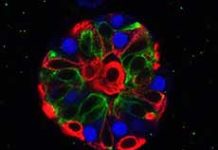Among 11,947 patients with metastatic or recurrent cancer that spanned across more than 50 different tumour types, 8% of patients had a tumour with germline alteration considered therapeutically actionable and 3.2% of these patients received germline genotype–directed treatment. The study team led by Dr. Zsofia K. Stadler of the Department of Medicine, Memorial Sloan Kettering Cancer Center in New York, NY, USA and colleagues published their findings in August 2021 issue of the Journal of Clinical Oncology. They wrote that germline sequencing analysis is additive to tumour sequencing analysis in terms of therapy selection. Therefore, the multigene germline genetic analysis should be considered for all patients with metastatic or recurrent cancer to guide treatment selection.
The authors explained in the background that tumour mutational profiling is increasingly performed in patients with advanced cancer to identify clinically actionable somatic alterations to guide the systemic therapy. Historically, germline genetic testing has focused more on early-stage cancers to identify cancer predisposition syndromes in patients who would benefit from risk-reducing surgery, chemoprevention, and enhanced cancer surveillance.
Wider utilisation of multigene germline panels and whole-exome analysis has recently demonstrated that pathogenic germline alterations are quite common in patients with cancer. Universal germline analysis for all patients with ovarian, pancreatic, advanced prostate, and metastatic breast cancers is now endorsed by the US National Comprehensive Cancer Network and tumour testing for markers of Lynch syndrome is recommended for all colorectal and endometrial cancers.
By using a prospective pan-cancer cohort, the study team designed the study to assess the utility of broad germline panel testing for selection of germline-directed therapy and to determine the extent to which germline mutation profiling guides therapy selection in patients with advanced cancer.
From 2015 to 2019, patients with cancer undergoing tumour genomic profiling in their institution were prospectively consented for germline cancer predisposition gene analysis. In patients harbouring germline likely pathogenic or pathogenic alterations, therapeutic actionability was classified using a precision oncology knowledge base. Patients with metastatic or recurrent cancer receiving germline genotype–directed therapy were determined.
In total, 2,037 patients (17%) harboured a germline likely pathogenic or pathogenic variant. By oncology knowledge base classification, 1,042 patients (9%) had likely pathogenic or pathogenic variant in a gene with therapeutic implications: 4% level 1, 4% level 3B, and less than 1% level 4.
BRCA1/2 variants accounted for 42% of therapeutically actionable findings, followed by CHEK2 (13%), ATM (12%), mismatch repair genes (11%), and PALB2 (5%).
When limited analysis to the 9,079 patients with metastatic or recurrent cancer, 710 (8%) harboured level 1 or 3B genetic findings and 289 (3.2%) received germline genotype–directed therapy. Germline genotype–directed therapy was received by 61% and 18% of metastatic cancer patients with level 1 and level 3B findings, respectively, and by 54% of BRCA1/2, 75% of mismatch repair, 43% of PALB2, 35% of RAD51C/D, 24% of BRIP1, and 19% of ATM carriers.
Among those with BRCA1/2 who received PARP inhibitor, 84 of 188 (45%) had tumours other than breast or ovarian cancer, wherein the drug, at time of administration, was delivered in an investigational setting.
The authors commented that with increasing number of genes with germline alterations predictive of drug response and the proliferation of tumour agnostic basket studies assessing germline genotype–directed treatments, the tumour agnostic evaluation of patients with metastatic or recurrent cancer for potentially actionable germline alterations should be considered.
Their study findings indicate that using a multigene panel that incorporates BRCA1/2 and other homologous recombination repair genes, as well as the mismatch repair genes, appears a reasonable for patients with metastatic or recurrent cancers.
The authors also commented that it is needed to tackle in the future standardised classification of the increasing number of germline alterations with therapeutic actionability and the impact of germline-directed therapies in patients with early-stage cancer.
The study was supported in part by the Marie-Josée and Henry R. Kravis Center for Molecular Oncology at Memorial Sloan Kettering; the Precision, Interception and Prevention Program at Memorial Sloan Kettering; the Robert and Kate Niehaus Center for Inherited Cancer Genomics at Memorial Sloan Kettering; the Romeo Milio Lynch Syndrome Foundation; and the US National Institutes of Health National Cancer Institute Cancer Center grant.
Reference
Stadler ZK, Maio A, Chakravarty D, et al. Therapeutic Implications of Germline Testing in Patients With Advanced Cancers. Journal of Clinical Oncology 2021;39(24):2698-2709. DOI: 10.1200/JCO.20.03661.










